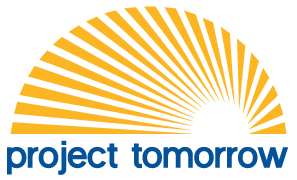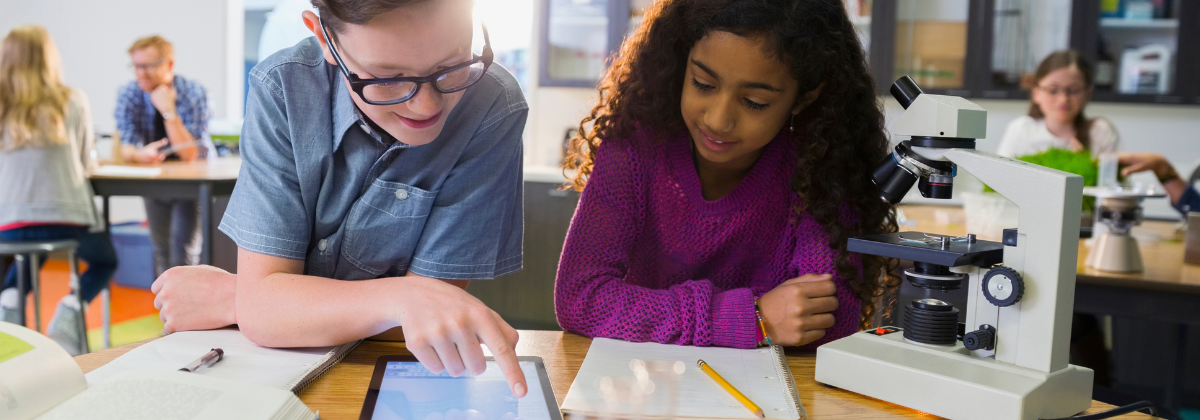For Immediate Release:
October 23, 2019
CONTACT:
Pilar Comparan
949-609-4660
pcomparan@tomorrow.org
Digital Learning: Peril or Promise for K-12 Students
With increased access to technology, students value digital learning to support college and career ready skills. Parents endorse the benefits of future skill development but still worry about too much screen time outside of school.
Washington, D.C. – America’s K-12 students have more access to technology in their classrooms to support learning than ever before, according to new research published by Project Tomorrow. A majority of schools (57%) now provide their students with a 1:1 assigned mobile device (tablet, laptop or Chromebook) to use for schoolwork significantly changing the dynamic for learning in the classroom. For example, in the 2014/15 school year, 50% of middle school students had to go to a computer lab or media center at their school to get online. Based upon new data from the 2018/19 school year, 64% of middle school students are now using a Chromebook right in their classroom to support learning, with only one-quarter saying their only technology access is in the computer lab. This increased device availability has resulted in more frequent student usage of cloud-based collaboration tools, online videos, digital textbooks and software and apps to help student learn skills in core subject areas like math and English. Students report that having access to technology results in their achievement of better academic outcomes, development of creativity and critical thinking skills, and a more personalized learning environment.
These are among the findings released today at a Congressional Briefing in Washington, D.C. by Project Tomorrow, the national education nonprofit organization that conducts the annual Speak Up Research Project. A companion briefing paper and infographic examines the role of technology in students’ learning lives, both in and out school, and addresses key concerns about too much screen time, teacher effectiveness using technology and equity considerations with digital learning. The data findings are based upon feedback collected from 343,500 K-12 students, parents, teachers, administrators and community members during the 2018/19 school year.
“We must continue to support and invest in our students as they work to gain the skills needed to be competitive in this 21st century economy. As a Math major myself, I’m encouraged to see more and more young people pursuing STEM education,” said Senator Tammy Baldwin (WI). I applaud the work that Project Tomorrow does nationwide to ensure our students have what they need to be successful in the future and are prepared to compete and contribute in a global economy.”
Of special emphasis in this year’s Speak Up findings is new information about parents’ views on their child’s use of technology. Over 8 in 10 parents of school-aged children say that the effective use of technology in school is important for their child’s future success. Across all grades, parents’ top concerns about technology use in their child’s school is that it varies too much from class to class based upon teachers’ comfort and proficiency using digital tools, content and resources within instruction. While 64% of parents say they are concerned about their child being exposed to too much screen time in general, only 32% of parents say that this concern extends to school time use of digital tools, indicating that parents value digital learning experiences differently than their child’s use of smartphones and tablets for entertainment or non-academic activities. Only 3% of parents in this national poll indicate that students should not have any access to mobile devices in their classroom.
“As a company committed to delivering education technology and solutions that drive student success, Blackboard relies on research like Project Tomorrow’s Speak Up report to help inform innovations that solve real challenges students, parents, and instructors face each and every day,” said Christina Fleming, Vice President of K12 at Blackboard. “Our partnership with Project Tomorrow and the range of perspectives their research surfaces, is instrumental in facilitating more candid conversations with stakeholders dedicated to improving students’ learning experience.”
Key to realizing the benefits of technology use in the classroom however is the effectiveness of teachers to use these tools to support new learning environments for students. Teacher comfort with using digital tools to facilitate student collaborations for example remains low with only one-fifth of classroom teachers nationwide saying that they are very comfortable doing that currently. The national briefing paper includes a review of what teachers say they need to use technology more effectively in their classroom. That wish list includes infrastructure components (classroom set of mobile devices, high capacity bandwidth, and just in time tech support) as well as professional learning experiences and planning time with colleagues. Indicative of changing values around technology use in school, teachers new to the profession with less than 3 years of experience are almost twice as likely as more veteran teachers to want detailed information on classroom strategies for using technology within instruction. “The Anaheim Elementary School District uses the feedback taken from the Speak Up Survey to serve as the foundation of affirmation of our programs, planning for new innovation and the identification of future actions based on needs,” said Christopher Downing, Superintendent, Anaheim Elementary School District (CA). “Quite simply, the survey provides authentic data from our stakeholders that informs and drives the success of our District. As a result of our stakeholders seeing their feedback used as a driver for change, the participation rate has skyrocketed. I would encourage all districts to not only implement the Speak Up Survey but to, more importantly, listen to the stakeholders’ feedback and act on what’s learned.”
Project Tomorrow’s Speak Up Research Project is dedicated to the inclusion of K-12 stakeholder voices in local education decisions and the organization provides every participating school or district with their own locally collected data through the Speak Up Project as a free service. Project Tomorrow is incorporating this philosophy of the importance of stakeholder ideas in the release of this year’s national briefing paper. Over the next two weeks, educators, parents, students and community members can comment on the national Speak Up findings prior to the final publication of the national briefing paper. To view the paper and provide commentary, please visit http://bit.ly/2018_19SpeakUpNationalBriefingPaper. A sampling of representative comments will be included in the final publication of the paper.
About Project Tomorrow & Speak Up
Project Tomorrow is the nation’s leading education nonprofit group dedicated to ensuring that today’s K-12 students are well prepared to become tomorrow’s leaders, innovators and engaged citizens of the world. The Speak Up Research Project is a national initiative of Project Tomorrow. Since 2003, the annual Speak Up project has collected and reported on the views of more than 5.7 million K-12 students, teachers, administrators and parents representing more than 35,000 schools in all 50 states. This represents the largest collection of authentic, unfiltered stakeholder input on education, technology, schools of the future, science and math instruction, professional development and career exploration.
Project Tomorrow’s research goal is to help build the capacity of education leaders to create new learning experiences that prepare today’s students to compete and contribute to the global economy and society. To share the Speak Up 2018-19 national findings, Project Tomorrow is creating a series of briefing papers and infographics to address key topics in the effective use of technology to enable new learning experiences and empower educational effectiveness. Learn more.

